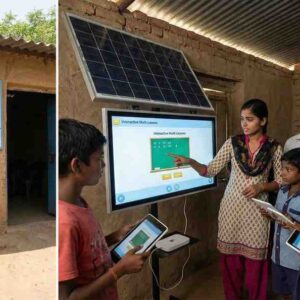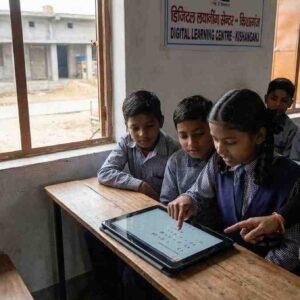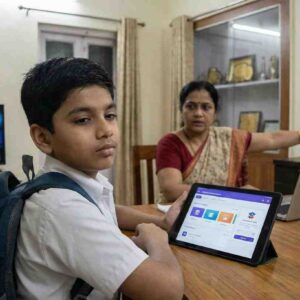A Silent Revolution Reshaping Indian Classrooms
India’s education landscape has undergone a dramatic shift with the rise of EdTech platforms like BYJU’S, Vedantu, and Unacademy. What began as a necessity during the pandemic has quietly become the new “normal” in Indian households. From personalized learning tools to skill-based courses, EdTech now plays a central role in shaping not just education, but also the values associated with success, learning, and competition.
How EdTech is Redefining Educational Values
- Achievement Over Understanding
- EdTech platforms, driven by gamification and performance metrics, emphasize outcomes—scores, ranks, and completed modules.
- Students are increasingly valuing achievement in the form of certificates and badges rather than deep conceptual learning.
- The Rise of “Prestige Learning”
- Premium courses in coding, AI, and international test prep have created a sense of exclusivity. Enrolling in top-tier EdTech programs has become a marker of social status, particularly among urban, affluent families.
- Parents feel pressured to showcase their child’s learning achievements, further reinforcing this trend.
- Competition in the Digital Classroom
- Features like leaderboards and progress trackers subtly pit students against one another, promoting a culture of constant competition.
- In a country where academic success has long been glorified, EdTech is intensifying the pressure to stay ahead—even outside traditional schools.
The Changing Role of Parents
Indian parents, known for their deep involvement in their child’s education, now find themselves more engaged than ever:
- From Supporters to Supervisors:
Parents are no longer passive observers but active monitors of their child’s digital progress. Weekly reports and AI-driven analytics allow them to track every milestone, creating silent pressure to “do better.” - Financial Priorities Shift:
The growing influence of EdTech has led to significant investments in subscriptions, often seen as non-negotiable for securing a child’s future.
“Education has become a competitive race even at home,”says Ritu Sharma, a mother of two from Delhi.“If my child isn’t on the leaderboard, it feels like we are not doing enough.”
Values in Learning: What Are We Losing?
- A Decline in Holistic Growth
- EdTech’s focus on technical skills, such as coding and analytics, risks overshadowing creative thinking, arts, and values like empathy and collaboration.
- Individual Over Community Learning
- Traditional classrooms foster group discussions and peer support. In contrast, EdTech’s individualized format can leave students isolated and overly self-focused.
- The Erosion of Patience
- Instant results and AI-driven feedback promote a culture of immediacy, where students expect quick success rather than appreciating the slow, steady process of learning.
The Digital Divide: A Question of Fairness
The “new normal” in education is far from universal.
- Urban Privilege:
Students in metro cities enjoy access to premium tools, while rural and low-income families struggle with connectivity and affordability. - Widening Gaps:
The values of achievement and competition amplified by EdTech deepen the divide between those who can afford these platforms and those who cannot.
The Road Ahead: A Balanced Approach to Values
- Prioritizing Holistic Development:
- EdTech platforms need to integrate programs that nurture creativity, collaboration, and critical thinking alongside technical skills.
- Collaborative Learning Tools:
- Introducing group projects and peer-driven modules can help bring back the spirit of community learning.
- Addressing Socio-Economic Inequality:
- Public-private initiatives can bridge the digital divide, ensuring that learning values are not dictated by privilege.
- Parental Mindset Shift:
- Parents must focus on their child’s overall growth rather than chasing scores and achievements.
Conclusion: A Quiet Cultural Shift
EdTech has undeniably revolutionized education in India, making learning more accessible, personalized, and efficient. However, its quiet influence is also reshaping the very values associated with education—prioritizing achievement over understanding, competition over collaboration, and status over substance.
As India embraces its digital education future, the challenge lies in ensuring that technology enriches education without compromising the values that make learning meaningful.
Is EdTech empowering Indian students, or is it silently redefining education in ways we are yet to understand?










